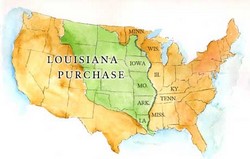Thomas Jefferson Louisiana Purchase
|
| updated |
Copy Link Code
|
 In 1803, the French government under Napoleon entered into negotiations with the U.S. administration of Thomas Jefferson on the sale of France's remaining territory in North America. Many factors involved in the Louisiana Purchase were outside of the control of Jefferson and his Cabinet, but their decision to move ahead with the negotiations before waiting on congressional approval made it a great accomplishment at a very nice price. For $15 million, Thomas Jefferson and the Louisiana Purchase more than doubled the land of the United States of America. The money was not an issue for a nascent nation looking to expand and protests from Federalist legislators over the unauthorized talks were at a minimum in the midst of such a popular territorial move. Although political rivals such as Alexander Hamilton would call it "dumb luck," Jefferson certainly deserves credit for manipulating international circumstances to the advantage of the young United States.
In 1803, the French government under Napoleon entered into negotiations with the U.S. administration of Thomas Jefferson on the sale of France's remaining territory in North America. Many factors involved in the Louisiana Purchase were outside of the control of Jefferson and his Cabinet, but their decision to move ahead with the negotiations before waiting on congressional approval made it a great accomplishment at a very nice price. For $15 million, Thomas Jefferson and the Louisiana Purchase more than doubled the land of the United States of America. The money was not an issue for a nascent nation looking to expand and protests from Federalist legislators over the unauthorized talks were at a minimum in the midst of such a popular territorial move. Although political rivals such as Alexander Hamilton would call it "dumb luck," Jefferson certainly deserves credit for manipulating international circumstances to the advantage of the young United States.
After failing to suppress several slave revolts in the Caribbean and losing the colony of Haiti to an independence movement, France had lost much of its potential revenue and was further stretched by its belligerent ambitions in Europe. Napoleon Bonaparte needed great sums of money to finance his war machine and was willing to make quick deals for cash. Aware of the situation and the potential boon for his country, President Jefferson dispatched a former ambassador to France and future fifth President of the United States, James Monroe, to Paris where he met with a nobleman by the name of Pierre Samuel du Pont de Nemours who was a friend of both Jefferson and Napoleon. The eventual price was actually the first one offered by Napoleon and Jefferson acted quickly, some would say beyond his Constitutional authority, to finalize the deal. Although the important port city of New Orleans would immediately transfer into American hands, much of the territory purchased remained under contention as Britain and Mexico still claimed portions of the North and South until as late as the Polk administration. Despite the reality of the claim's insecurity, Thomas Jefferson and Louisiana Purchase negotiators would immediately be hailed as leaders of the imminent American expansion.
As the leader of the first independent, democratic nation in the Western Hemisphere, it would seem logical that Thomas Jefferson might support the birth of a second democracy in the New World forged in a War of Independence against an old, European power. The revolution in Haiti, however, was frightening to Thomas Jefferson and many other slave-owning planters in the American South. Despite the sudden absence of France as a regional threat, Jefferson could not bring himself to support a nation of former slaves who had successfully rebelled; regardless of his ideals of liberty and equality, Jefferson acted out of fear and perceived necessity when he called for an embargo on Haiti that would cripple its recovery from the war for freedom. Although a colony or trade route through the Caribbean had also been on the mind of Thomas Jefferson, Louisiana Purchase territorial gains assured him that slavery would continue to expand and reap profits for the aristocracy of the United States.
